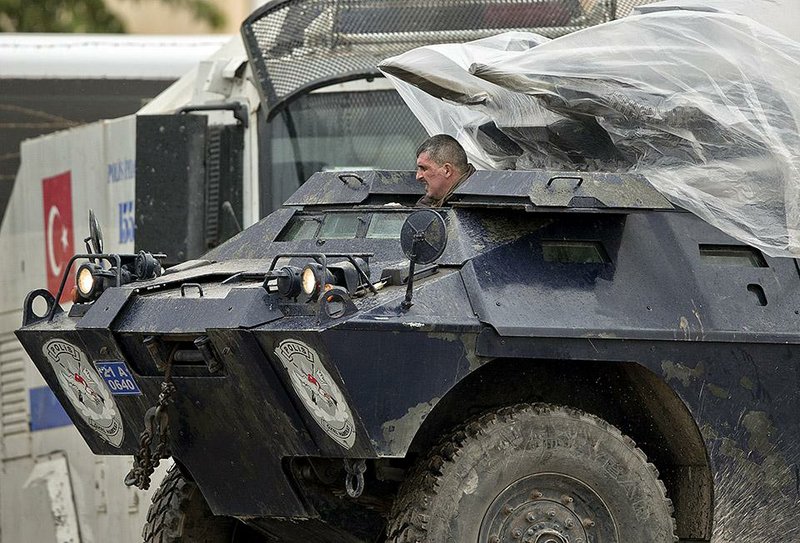SURUC, Turkey -- A vanguard force of Iraqi peshmerga troops entered the Syrian border town of Kobani from Turkey on Thursday, part of a larger group of 150 fighters that the Kurds hope will turn back an offensive by militants of the Islamic State extremist group.
The deployment, accompanied by 50 members of the Free Syrian Army, was condemned by Syria's government as an act of Turkish aggression and a "blatant violation of Syrian sovereignty."
The first group of Kurdish fighters crossed into Syria after heavy overnight clashes as Islamic State extremists tried but failed to capture the frontier post, the only gateway in and out of the town.
Kobani is under attack by the militants from three sides despite weeks of airstrikes by a U.S.-led coalition.
Mustafa Bali, an activist in the town, said the remaining troops will follow later in installments as a security precaution because the Islamic State fighters were targeting the border area.
"The first 10 are now with the People's Protection Units, and they include doctors and fighters, and the rest are expected to enter in the coming hours at night," Bali said.
The People's Protection Units are the main force in predominantly Kurdish regions of northern Syria.
Other peshmerga forces were assembled in a facility on the outskirts of the Turkish border town of Suruc, about 7½ miles from the Syrian frontier.
The Syrian Kurds have high expectations for the mission of the peshmerga troops, despite their low numbers. They are hoping that some of the more advanced weaponry they carry with them can help break a stalemate with the extremists, who outnumber and outgun the Kurds.
The U.S.-led coalition has carried out more than 150 airstrikes against the militants in and around Kobani, killing hundreds and helping stall their advance. But Syrian Kurds have pleaded for advanced weapons to help them gain the upper hand.
U.S. Central Command said there were 12 airstrikes in Syria, with 10 of those in the Kobani area since Wednesday. The coalition also is conducting airstrikes on militant positions in Iraq, where the group controls large sections of territory.
Islamic State militants began the attack on Kobani six weeks ago, capturing dozens of Kurdish villages in addition to parts of the border town. More than 200,000 people have fled to Turkey and more than 800 people have died, activists say.
On Wednesday, a group of 50 Syrian rebels also entered Kobani -- also through Turkey -- in a push to help Kurdish fighters there against the Islamic State militants. The rebels are from the Free Syrian Army and were meant to help the Iraqi peshmerga fighters and the town's Kurdish defenders.
The Free Syrian Army is an umbrella group of mainstream rebels trying to topple Syrian President Bashar Assad. The political leadership of the Western-backed group is based in Turkey, where fighters often seek respite from battle.
In Iraq on Thursday, an international-rights group said militants from the mostly Sunni Islamic State carried out a killings of hundreds of Iraqi prison inmates when they seized the country's second-largest city, Mosul, in June.
Some 600 male Shiite inmates from Badoosh prison outside Mosul were forced to kneel along the edge of a nearby ravine and shot with automatic weapons, Human Rights Watch said in a statement based on interviews with 15 Shiite prisoners who survived the massacre.
Also in June, the Islamic State group claimed it had "executed" about 1,700 soldiers and military personnel captured from Camp Speicher outside Tikrit city.
The onslaught by the Islamic State stunned Iraqi security forces and the military, which melted away and withdrew as the extremists advanced, capturing key cities and towns. The militants also targeted Iraq's indigenous religious minority groups, including Christians and followers of the ancient Yazidi faith, forcing tens of thousands from their homes.
Since then, the Islamic State has carved out a self-styled caliphate, or state ruled by Islamic Law, in the large area straddling the Iraqi-Syrian border that it now controls.
Gen. Martin Dempsey, chairman of the U.S. Joint Chiefs of Staff, said Thursday that the Pentagon is considering ways to bring the Sunni Arab tribes of Iraq's Anbar province more fully into the battle against the Islamic State. Enlisting the help of Anbar's tribes was critical to the success of U.S. efforts to stabilize Iraq in the latter stages of the Iraq War in 2007-08.
Dempsey said expanding U.S. train-and-advise efforts to include the tribes is one of three key elements of a strategy designed to roll back Islamic State fighters in northern and western Iraq.
The other elements are advising and assisting Iraqi government troops and creating so-called national guard units as a sort of quasimilitary force that must first gain legal approval from the Iraqi government.
Also Thursday, Norwegian Prime Minister Erna Solberg said her country will send 120 soldiers this year to join the international campaign against the Islamic State in Iraq and help train local troops there. Another 75 Norwegian soldiers will go to Afghanistan next year.
Information for this article was contributed by Elena Becatoros, Diaa Hadid, Bassem Mroue, Zeina Karam, Sinan Salaheddin, Lolita C. Baldor, Robert Burns and staff members of The Associated Press.
A Section on 10/31/2014
